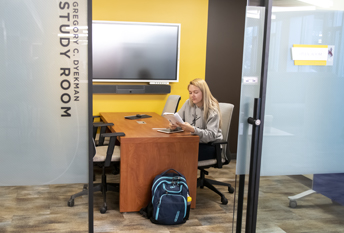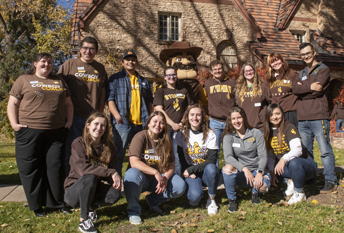
Contact Us
Institutional Communications
Bureau of Mines Building, Room 137
Laramie, WY 82071
Phone: (307) 766-2929
Email: cbaldwin@uwyo.edu
Keys to Academic Success
June 6, 2022

Student Cowboy Coach Emily Powell prepares for class in Coe Library.
Experts and students share their tips for studying, notetaking, time management and more.
One thing university students find out quickly: College is far different than high school. The pacing, the studying, the expectations—everything requires adjustment. To ease that transition and help you find your rhythm, we spoke to campus experts and students for their top tips.
Expert Advice
Learning Resource Network Manager Jess Willford and Manager of Academic Advising for ACES (Advising, Career and Exploratory Studies Center) Ben Herdt have made a career out of helping University of Wyoming students succeed. Here are their tips for academic success.
-
Log on to WyoCourses and look through all your class information before the start of the semester. Unlike high school, you’ll be doing lots of work that you’ll never turn in. You must hold yourself accountable.
-
Come to class prepared to learn. Use the bathroom before class. Put your phone away. Have things like water or gum handy.
-
Stop by your professor’s office hours in the first two weeks. Introduce yourself. Ask about their research or teaching. Ask any questions you have, including their tips for successful studying and notetaking in their class.
-
Every class requires a different approach. In addition to asking your instructor for tips, talk to classmates about what works for them, and play around with different approaches. Try a study group or find a study buddy. Continually evaluate your approach and what’s working for you.
-
If your instructor posts Skeleton Notes or PowerPoints, print them off in advance. Look them over so you know what to expect, then take notes during class in the spaces provided. After class, take a few minutes to review what you learned, then do the same before the next class. Like an athlete, study film and game day and then review the game, rather than burying your notes until the test. This helps you maintain your recall.
-
Learning what to write down in class takes practice. If the topic is on the Skeleton Notes or the instructor spends time on it, it’s a good sign that the information is important. Some students prefer to tape the lecture if it’s not already recorded. If this appeals to you, ask the instructor if it’s OK.
-
Be actively engaged. Write down questions you have, and connect your learning to other classes or real life. Do this with your textbooks as well—taking notes, jotting down questions and completing the practice problems before class.
-
Organize yourself with a three-ring binder for each class. Use a digital and/or paper planner. Set reminders on your digital calendar not just for due dates but also to begin assignments in advance.
-
For each credit hour, plan for two or three hours studying outside class. Treat college like a job. Between classes, study or go to tutoring. Using those chunks of time during the week can give you free time on nights or weekends to socialize and have some fun. It can also give you peace of mind.

CeeJay Berg, a student Cowboy Coach and College of Business Career Peer, studies in
the Peter and M. Paula Green Johnson Student Success Center
Student Time Management and Study Tips
“I recommend planning out your day with a checklist to go through and make sure you get done before you do anything else. I would use sticky notes and write what assignments I was going to do that day between classes. I got it done, so I had my evening off and was able to hang with friends, go downtown or eat! I also recommend making time to see friends and family. Study tips: Do not wait until the last minute because this is not high school anymore. Get good study habits started early. Utilize your paper or digital planner to track assignments. And if you keep your planner where you can see it, you are more likely to use it and pay attention to it.” –Emily Powell, Windsor, Colo., graduate student, pharmacy
“Planning out the day keeps me on schedule. I know people who schedule down to the hour, but I schedule based on morning, afternoon and evening. Knowing what needs to be accomplished by certain times of the day helps me keep track of to-do lists. Study tips: I think it’s helpful to have a specific place to go only for studying. When you have this location, it’s easier to get in the right headspace to focus. I also think it’s important to start out with three main goals, and once those are accomplished, take a break, then do three more.” Favorite places to study: coffee shops or the library. –Abigail Klenk, Loveland, Colo., senior, social studies secondary education and history with an ESL endorsement
“Giving myself a bedtime is my favorite tip! It keeps me on schedule and allows for very needed sleep. I also love a good, old-fashioned planner where I can write everything down and color code it. Study tip: My partner and I have recently started doing study dates by reserving a study room in the library. I feel like it has helped us both tremendously with focusing on our work while still spending quality time together. It has also allowed us to truly make our home a space to relax.” –Emilygrace Piel, Cheyenne, Wyo., senior, theatre and dance design tech management, focus in stage management
“Plan, plan, plan. I don’t plan every second of my day, but I do write down all of the things I need to get done that day, week, or month, even. Writing it down, typing it on my laptop, and getting notifications ingrains my responsibilities in my head, and I rarely ever forget anything because of it. Study tip: My best advice is to get yourself into a routine. And put the phone away! A huge part of successful studying is avoiding distractions.” Favorite places to study: STEM building, Coal Creek or Turtle Rock. –Erin McDonald, Colorado Springs, Colo., junior, chemistry
“My favorite time-management tip would be organizing my email calendar. This has proved to be so helpful, because not only can I have my class schedule on there, but I can block out study time as well. I have found that when I plan out two-hour study times, it is so much easier to sit down and focus.” Favorite place to study: Library study rooms. –Maddy Jenkins, Jackson, Wyo., senior, kinesiology
“My favorite time-management tip is having a planner so you can write down assignments, club meetings and work schedule and have a visualization of what you need to do that week. Study tips: Start early in the week and do it in time increments. The earlier you start, the easier it is to absorb that information.” Favorite place to study: the Union or downtown Coal Creek. –Ciara Thompson, Sterling, Colo., junior, social work with minors in disabilities studies and psychology
“I recommend setting boundaries for yourself—for example, finishing your homework before the weekend so you have time off or not working on assignments past 8 p.m. Separating school and personal time can be especially hard with online classes and the convenient midnight deadlines so many professors enjoy, but it’s so important to have a healthy school-work balance. Study tip: Make study groups in your classes! I would not have passed my difficult classes if it wasn’t for the help and support of my class friends.” Favorite place to study: fifth floor of Coe Library. –Lona van der Linden, San Diego, Calif., sophomore, computer science
“My tips for studying are to schedule time to study and find a place where you work well. I try to study when I have long stretches of time in between classes. I start out Monday morning by building a plan for the rest of my week in my Outlook calendar. I schedule time for meals, studying, the gym, classes and anything and everything else I need to accomplish that week.” Favorite places to study: third floor of Coe Library or the library annex. –CeeJay Berg, Rock Springs, Wyo., senior, accounting and economics, minors in honors and finance

Cowboy Coaches at the grand opening for “U-Dub Hub,” the UW Student Success and Graduation
Hub.
Campus Resources
There are many resources on campus dedicated to helping you succeed. Give them a try!
Tutoring: The STEP Tutor Center offers free one-on-one tutoring by appointment in Coe Library as well as drop-in tutoring in the basement of Washakie. Online tutoring is also available. You can learn about these and other tutoring options—as well as supplemental instruction study sessions—at www.uwyo.edu/step.
Math and writing centers: The Center for Assistance with Statistics and Mathematics (CASM), located in Ross Hall 029, offers free in-person drop-in tutoring for students enrolled in lower-division mathematics and statistics courses (www.uwyo.edu/mathstats/casm). The Writing Center in Coe Library (and online) can assist at all stages of the writing process, from brainstorming to revising a final draft (www.uwyo.edu/writing-center).
Bridge and Saddle Up: Students who meet eligibility requirements can take part in summer or fall Bridge preparedness programs (www.uwyo.edu/fallbridge), and all incoming UW students will now take part in the Saddle Up preparedness program (www.uwyo.edu/saddle-up).
Disability Support Services (DSS): Students with disabilities should self-identify with DSS. DSS in turn provides disability-related accommodations such as technical assistance, consultation and resource information (www.uwyo.edu/udss).
Student Success Services: Student Success Services is part of the TRIO education program funded by the U.S. Department of Education. Students who meet certain eligibility requirements—such as first-generation college students, students with limited income and students with disabilities—can access tools for academic success, financial literacy and career planning. (www.uwyo.edu/seo/sss)
ACES and college advisers: Students who are in an exploratory track or questioning their degree or career path can visit the Advising, Career and Exploratory Studies Center (www.uwyo.edu/aces). ACES advisers can help you determine your class schedule, find resources, and explore degrees and careers. If you declared a major, you will have a trained adviser within your college who can help you chart your path to graduation. Talk to your adviser about your interests, questions and long-term goals, as well as any concerns you have.
Cowboy Coaches: Your Cowboy Coach peer mentor is also a great resource for getting organized, finding resources, staying motivated and all other questions (www.uwyo.edu/student-success/cowboy-coaches).
Contact Us
Institutional Communications
Bureau of Mines Building, Room 137
Laramie, WY 82071
Phone: (307) 766-2929
Email: cbaldwin@uwyo.edu


